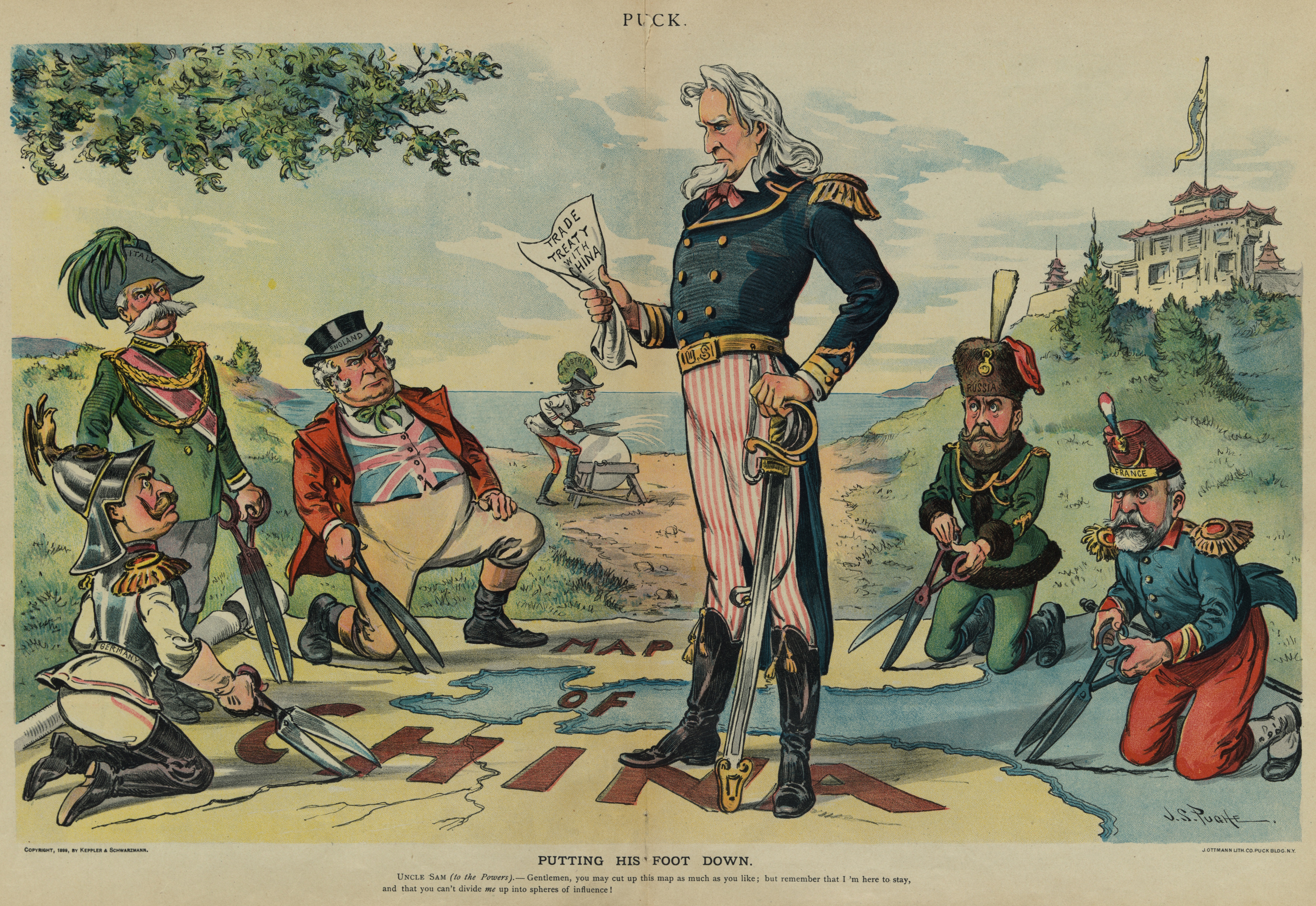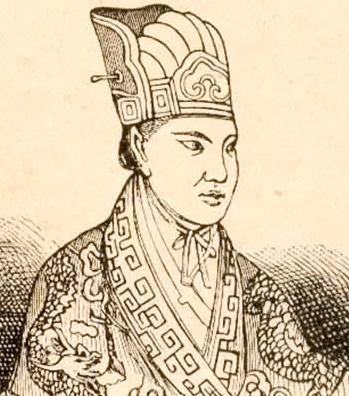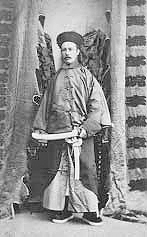|
Taiping Rebellion
The Taiping Rebellion, also known as the Taiping Civil War or the Taiping Revolution, was a civil war in China between the Qing dynasty and the Taiping Heavenly Kingdom. The conflict lasted 14 years, from its outbreak in 1850 until the fall of Taiping-controlled Nanjing—which they had renamed Tianjing "heavenly capital"—in 1864. The last rebel forces were defeated in August 1871. Estimates of the conflict's death toll range between 20 million and 30 million people, representing 5–10% of China's population at that time. While the Qing ultimately defeated the rebellion, the victory came at a great cost to the state's economic and political viability. The uprising was led by Hong Xiuquan, an ethnic Hakka who proclaimed himself to be the brother of Jesus Christ. Hong sought the religious conversion of the Han people to his God Worshipping Society, syncretic version of Christianity, as well as the political overthrow of the Qing dynasty, and a general transformation of the mech ... [...More Info...] [...Related Items...] OR: [Wikipedia] [Google] [Baidu] |
Century Of Humiliation
The century of humiliation was a period in Chinese history beginning with the First Opium War (1839–1842), and ending in 1945 with China (then the Republic of China) emerging out of the Second World War as one of the Big Four and established as a permanent member of the United Nations Security Council, or alternatively, ending in 1949 with the founding of the People's Republic of China. The century-long period is typified by the decline, defeat and political fragmentation of the Qing dynasty and the subsequent Republic of China, which led to demoralizing foreign intervention, annexation and subjugation of China by Western powers, Russia, and Japan. The characterization of the period as a "humiliation" arose with an atmosphere of Chinese nationalism following China's defeat in the First Sino-Japanese War of 1894-1895 and the subsequent events including the scramble for concessions in the late 1890s. Since then the idea of national humiliation became a focus of discussi ... [...More Info...] [...Related Items...] OR: [Wikipedia] [Google] [Baidu] |
Jirhangga
Jirhangga (Manchu: ; Chinese: 吉爾杭阿; also known as Koer-hanger in English; died June 1, 1856) was an eminent Manchu official in the late Qing dynasty. He served as the Governor of Jiangsu, which belonged to Bordered Yellow Banner, and was appointed to that post by Imperial Commissioner Xiang Rong (). He was killed in action by rebels during the Taiping Rebellion. Actions against Small Swords Society Recovery of Shanghai county Before the Chinese New Year of 1856, Jirhangga and the Mayor of Nanjing led 15,000 troops into Shanghai. This was followed by street fighting, the recovery of the Shanghai county, and the arrest of thousands of Small Swords Society members. Organizing the Corps at Mount Jiuhua In March 1856, Jirhangga and Nanjing's Mayor led 40,000 troops stationed in Mount Jiuhua. The army was intended to capture the capital of the Taiping Rebellion in Nanjing. Death In 1856, when the Taiping General Qin Rigang brought forces to strengthen the offensive against ... [...More Info...] [...Related Items...] OR: [Wikipedia] [Google] [Baidu] |
Xiao Chaogui
Xiao Chaogui (; 1820 – September 1852) was an important leader during the early years of the Taiping Rebellion against the Qing dynasty of China. He was a sworn brother to Hong Xiuquan, the leader of the Taipings, and claimed to serve as a mouthpiece for Jesus Christ. Because of his importance to the rebellion, he was awarded the title of the "West King." Early life Xiao Chaogui was a poor peasant farmer from Wuxuan, now part of Guiping, in the Thistle Mountain region of Guangxi. Despite his modest means, he became an influential leader in the region. He was probably a member of the Hakka people, but it has also been suggested that he was Yao. He may have been a relative of Yang Xiuqing. He, along with his wife, father, and brothers, joined Hong Xiuquan's Society of God Worshippers. He possessed a "legendary reputation for valor and physical strength." Wife He was married to Yang Yunjiao, a zealous God Worshipper. Yang claimed to have visited Heaven in 1837 during ... [...More Info...] [...Related Items...] OR: [Wikipedia] [Google] [Baidu] |
Feng Yunshan
Feng Yunshan (; 1815 – June 10, 1852) was the South King of the Taiping Heavenly Kingdom, a distant cousinJen Yu-wen, The Taiping Revolutionary Movement 22–23 (1973) and early accomplice of Hong Xiuquan, and an important leader during the Taiping Rebellion against the Qing government. He was one of the first Taipings to be baptized and established the first group of God Worshippers during the 1840s. He was killed during the initial stages of the rebellion, prior to the establishment of the Taiping's capital of Tianjing at Nanjing. Early life Feng Yunshan worked as a village teacher in Heluo Village, Hua county, Guangdong. Although educated, he was unable to pass the imperial examinations. Like Hong Xiuquan, he was a Hakka, and he was among the first of Hong's converts to Hong's new religion, backlash to which cost him his teaching position. Feng, Hong, and two other relatives of Hong left Hua county in April 1844. They first traveled to Guangzhou and preached in the outlyin ... [...More Info...] [...Related Items...] OR: [Wikipedia] [Google] [Baidu] |
Yang Xiuqing
Yang Xiuqing () (died September 2/3, 1856), was an organizer and commander-in-chief of the Taiping Rebellion. Early life Yang Xiuqing's family were farmers from Xincun near Jintian, Guangxi, but he lost his parents at a young age. According to imperial reports, Yang was a charcoal burner with some education who later organized a convoy system used to protect merchandise that was being transported through the area from bandits. His brother Yang Fuqing also later became a Taiping military commander. Society of God-Worshippers In April 1848, while Feng Yunshan and Hong Xiuquan were in a neighboring province, Yang assumed a leadership role in the God-Worshipping Society. Yang claimed to have been stricken deaf and mute only to have regained his hearing and speech at a meeting of the God Worshippers. He began to claim that he could enter trances in which he would be possessed by the Holy Spirit ( Fei Lian), allowing God the Father (Shangdi) to speak through him. It does not ap ... [...More Info...] [...Related Items...] OR: [Wikipedia] [Google] [Baidu] |
Hong Xuanjiao
Hong Xuanjiao (, born - fl. 1856), also known as Yang Yunjiao () and Yang Xuanjiao (), was a Chinese general and rebel leader during the Taiping Rebellion. She was said to be the younger sister of the leader of Taiping Heavenly Kingdom, Hong Xiuquan, and the wife of Xiao Chaogui, the West King. She led women into the battlefield against the Qing dynasty for the Taiping cause. Life Hong Xuanjiao is believed to have been born around 1830 to a man named Huang Quanzheng (黃權政) in Luoludong (羅淥峒), Wuxuan county, Guangxi province. She was later adopted as a sister of Yang Xiuqing, the East King, who claimed the Heavenly Father willed that Xuanjiao should bear the surname Yang as she is his sixth daughter. Some time after her wedding to Xiao Chaogui, on 30 January 1850, Xiao claimed that Jesus Christ specified him as a brother-in-law equivalent to Hong Xiuquan, Feng Yunshan, and Yang Xiuqing. It is in this manner that Xuanjiao became a sister of Hong Xiuquan and became kno ... [...More Info...] [...Related Items...] OR: [Wikipedia] [Google] [Baidu] |
Hong Tianguifu
Hong Tianguifu (23 November 1849 – 18 November 1864) was the second and last king of the Taiping Heavenly Kingdom. He is popularly referred to as the Junior Lord (). Officially, like his father Hong Xiuquan, he was the King of Heaven (). To differentiate, he is also called the Junior King of Heaven (). History Hong was born in village in Hua County (present-day Huadu District), Guangdong. Initially given the first name Tiangui (天貴; "Heaven's Precious"), his father added an additional character (福; "happiness/"blessing") around 1860, making his name unusual, as Chinese given names typically have only one or two characters. The name change came amid Hong Xiuquan's increased focus on mysticism and belief that Hong was fit to replace him as "worldly leader". In the kingdom's hierarchy, Hong was referred to as "The Young Monarch of 10,000 years", mirroring his father's title "Heavenly King, Lord of 10,000 years". Hong succeeded his father on 2 June 1864, a day after his de ... [...More Info...] [...Related Items...] OR: [Wikipedia] [Google] [Baidu] |
Hong Xiuquan
Hong Xiuquan (1 January 1814 – 1 June 1864), born Hong Huoxiu and with the courtesy name Renkun, was a Chinese revolutionary and religious leader who led the Taiping Rebellion against the Qing dynasty. He established the Taiping Heavenly Kingdom over large portions of southern China, with himself as its "Heavenly King". Born into a Hakka family in Guangzhou, Hong claimed to have experienced mystical visions after failing the imperial examinations. He came to believe that his celestial father, whom he saw in the visions, was God the Father, his celestial elder brother was Jesus Christ, and he had been directed to rid the world of demon worship. He rejected Confucianism and began propagating a fusion of Christianity, Daoism and millenarianism, which Hong presented as a restoration of the ancient Chinese faith in Shangdi. His associate Feng Yunshan then founded the God Worshipping Society to spread Hong's teachings. By 1850, Hong's sect had over 10,000 followers and incre ... [...More Info...] [...Related Items...] OR: [Wikipedia] [Google] [Baidu] |
Charles George Gordon
Major-general (United Kingdom), Major-General Charles George Gordon Companion of the Order of the Bath, CB (28 January 1833 – 26 January 1885), also known as Chinese Gordon, Gordon Pasha, Gordon of Khartoum and General Gordon , was a British Army officer and administrator. He saw action in the Crimean War as an officer in the British Army. However, he made his military reputation in Qing Dynasty#Rebellion, unrest, and external pressure, China, where he was placed in command of the "Ever Victorious Army", a force of Chinese soldiers led by European officers which was instrumental in putting down the Taiping Rebellion, regularly defeating much larger forces. For these accomplishments, he was given the nickname "Chinese Gordon" and honours from both the Emperor of China and the British. He entered the service of the Isma'il Pasha, Khedive of Egypt in 1873 (with British government approval) and later became the List of governors of pre-independence Sudan, Governor-General of the ... [...More Info...] [...Related Items...] OR: [Wikipedia] [Google] [Baidu] |
Auguste Léopold Protet
Auguste Léopold Protet (; 1808 – 1862) was a French Navy admiral. He fought in the Second Opium War, and was killed in the Taiping Rebellion at the Fengxian District of Shanghai on the afternoon of 17 May 1862. He was born at Saint-Servan, France, and at sixteen he was admitted into the naval school of Angoulême. When he was 38, he received the commission of captain in the royal navy. At this time the English and French governments combined their efforts to put an end to the slave trade on the African coast, and Protet was employed in that service. After cruising three years on the coast of Africa he was appointed governor of Senegal Senegal, officially the Republic of Senegal, is the westernmost country in West Africa, situated on the Atlantic Ocean coastline. It borders Mauritania to Mauritania–Senegal border, the north, Mali to Mali–Senegal border, the east, Guinea t ..., where he remained from 1850 to 1855. He served during the war with China, and was promoted to ... [...More Info...] [...Related Items...] OR: [Wikipedia] [Google] [Baidu] |
Frederick Townsend Ward
Frederick Townsend Ward (; November 29, 1831September 22, 1862) was an American sailor and mercenary known for his military service in Imperial China during the Taiping Rebellion. He commanded the Ever Victorious Army, a joint Sino-foreign force, against the Taiping rebels. He remained in command of the Ever Victorious Army until his death in battle in 1862, after which leadership was taken over by Henry Andres Burgevine. Early life and education Ward was born in Salem, Massachusetts on November 29, 1831. Ward was rebellious in his youth, so his father removed Ward from school in 1847 and found him a position as second mate on the ''Hamilton'', a clipper ship commanded by a family friend. Another version is that Ward demanded to leave school. Life at sea proved difficult. Ward was given authority over many "old salts". He was thrown overboard after complaints that he gave too many orders for a youth. Captain William Allen recalled that Ward possessed traits of "reckless daring ... [...More Info...] [...Related Items...] OR: [Wikipedia] [Google] [Baidu] |
Xiang Rong
Xiang Rong (; 18019August 1856) was a Chinese military general and politician. He was born in Wuxi County, Chongqing, and was promoted from the rank of a foot soldier during the later years of the Qing dynasty (16441912). He was involved in early military operations against the Taiping Rebellion in Henan from 1850 onwards. From then he was a Senior Colonel, after one year the military promoted him be the '' tidu'' (提督) of Guangxi, even though he failed, he made the Taiping believers flee Guangxi. Continuing after Guangxi, Xiang Rong never gave up and tracked the Taiping rebels across three province to Jiangnan in southern China. His Jiangnan Battalion (part of the Green Standard Army) was constantly defeated by the Taiping rebel army outside Nanjing Nanjing or Nanking is the capital of Jiangsu, a province in East China. The city, which is located in the southwestern corner of the province, has 11 districts, an administrative area of , and a population of 9,423,40 ... [...More Info...] [...Related Items...] OR: [Wikipedia] [Google] [Baidu] |




